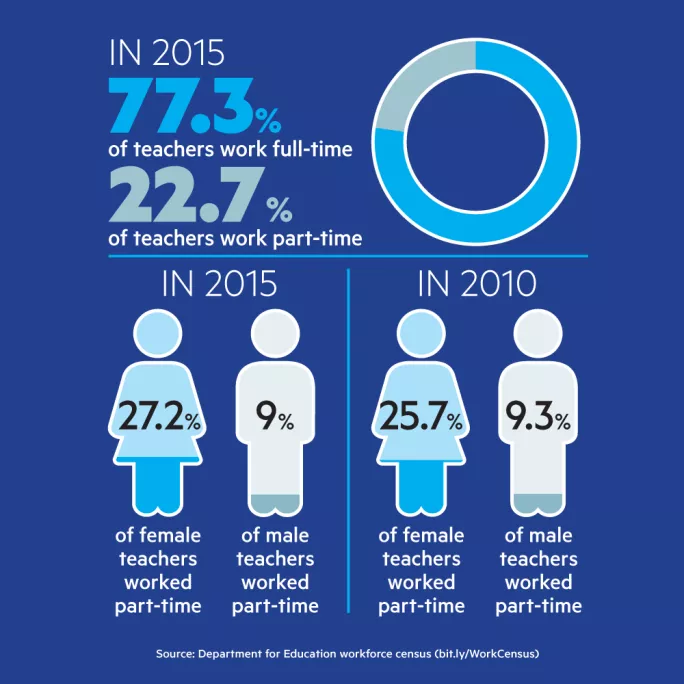‘Embrace part-time working to beat recruitment crisis’

Heads are frequently approached by staff hoping to work part-time - motivated by family commitments or a fear that the workload of a full-time role is now unmanageable.
These requests sometimes come thick and fast, and, for managers, they can feel rather inconvenient. But heads need to embrace flexible working to limit the impact of the teacher recruitment and retention crisis, a new report from a group of education experts warns.
The study acknowledges there are practical considerations involved in managing part-time workers, but also highlights the potential benefits, such as being able to employ part-time specialist teachers rather than moving full-time teachers out of their subject area.
Also, allowing members of staff to work flexibly allows schools to retain teachers who might otherwise leave.
“Timetabling is very sophisticated and it should be possible to build in blocks so that a qualified maths teacher can do three days a week, if they want to do three days a week,” said Chris Waterman, who produced the report based on conversations between unions, subject associations, teacher-training providers and other education experts.

Mr Waterman, who is secretary of the All-Party Parliamentary Group for the Teaching Profession, added: “If you use part-time teachers you can get highly qualified teachers doing the job. If the alternative is that all of the teachers are full-time, then you may get PE teachers doing PSHE, or English teachers teaching maths.”
But what about those practical considerations? Many part-time posts arise from requests from staff who had previously been full-time.
The risk of refusal
Headteachers need to consider all applications for flexible working according to their individual circumstances, and balance the benefits with the impact on students and the school. And they need to tread carefully.
The NAHT headteachers’ union advises school leaders that if a request for job-share or part-time working is refused, then the school must be able to demonstrate objectively why the post concerned is not available for a job share or part-time working. It warns that refusals can be challenged.
The union offers the following advice: “Simply stating that job sharing or part-time working is educationally unsound, more expensive or difficult to manage has already proved to be an insufficient defence against a claim of sex discrimination.”
The idea of recruiting part-time staff has some way to go
The NAHT recommends that schools seek HR and legal services advice before refusing a request from their employees, who may be protected by discrimination legislation.
But headteachers may well be keen to grant requests for part-time working, perhaps:
* to allow experienced staff to return to work after maternity leave more quickly;
* as an alternative to early retirement for those in their final years of service;
* to provide a greater range of expertise.
Once such decisions have been made, some aspects of management will change. Keeping part-time staff involved in the wider work of the school and making sure they can still access training is important, according to Geoff Barton, head of King Edward VI School in Bury St Edmunds.
Good communication is also crucial - not just within the school, but with parents, too. Parents can expect classes to be led by one teacher in primary, so they can take “a dim view” if two teachers are coming in, said Valentine Mulholland, head of policy at the NAHT.
Flexible working doesn’t have to just be about working fewer than five days a week. It also covers job-sharing, working from home, compressed hours (full-time hours in fewer days), flexitime, annualised hours, staggered hours or phased retirement.
“Another way of working part-time for some parents would be to have the first and the last period off, so they could collect their children from school. If a school can’t create more working practices to support families, what hope is there for the rest?” said Mr Waterman.
‘Breach of workers’ rights’
Earlier this year, the government White Paper Educational Excellence Everywhere pledged to do more to enable flexible working in schools, and education secretary Justine Greening has confirmed that she wants to support the introduction of part-time roles.
But the NASUWT teaching union is demanding drastic action. It looked into 3,000 requests and found that nearly a third of them were turned down - with nearly all requests from teachers in leadership positions being refused. It is concerned that too many teachers are being denied their right to flexible working. The union has now called for the secretary of state to review the extensive discretion that schools have to refuse requests.
Ms Mulholland said that the role of the part-time or flexible worker was not seen as a genuine alternative to full-time work. “Heads would not necessarily think of part-time workers if they were struggling to fill a role,” she said. “There may be a lack of awareness over the extent to which some people would be drawn by a part-time job. The idea of recruiting part-time staff has some way to go.”
The report, Teaching Supply: Recruitment, Retention, Shaping the Future, is available here.
You need a Tes subscription to read this article
Subscribe now to read this article and get other subscriber-only content:
- Unlimited access to all Tes magazine content
- Exclusive subscriber-only stories
- Award-winning email newsletters
Already a subscriber? Log in
You need a subscription to read this article
Subscribe now to read this article and get other subscriber-only content, including:
- Unlimited access to all Tes magazine content
- Exclusive subscriber-only stories
- Award-winning email newsletters